Which Natural Cures Work—and Which Don't
Supplements for a healthier heart. Chiropractic to ease back pain. Acupuncture for better sleep. Our experts reveal the treatments to use and the ones to avoid.
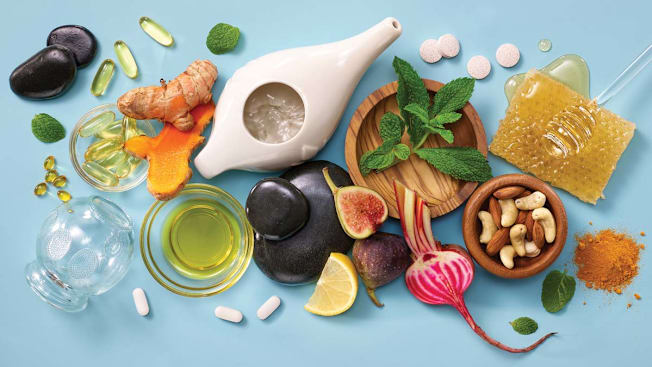
Our interest in nontraditional treatments for conditions like arthritis, back pain, insomnia, and high blood pressure has probably never been higher. Nearly 40 percent of Americans tried an approach like yoga, meditation, acupuncture, or chiropractic in 2022, according to an analysis published in JAMA—about double the percentage who went for such therapies 20 years earlier. A September 2024 Consumer Reports nationally representative survey of 2,146 U.S. adults found that 40 percent had taken a dietary supplement like fish oil, melatonin, or vitamins to treat a specific medical problem, and 64 percent of them said that it helped.
Why are we so keen on these different ways of handling our health concerns? A 2020 review in the journal BMC Complementary Medicine and Therapies concluded that it’s partly due to dissatisfaction with conventional medicine. "People increasingly seek more holistic approaches to health, which emphasize prevention and overall well-being, rather than just addressing symptoms," says Jeremy Ng, PhD, editor in chief of the journal Complementary and Integrative Medicine.
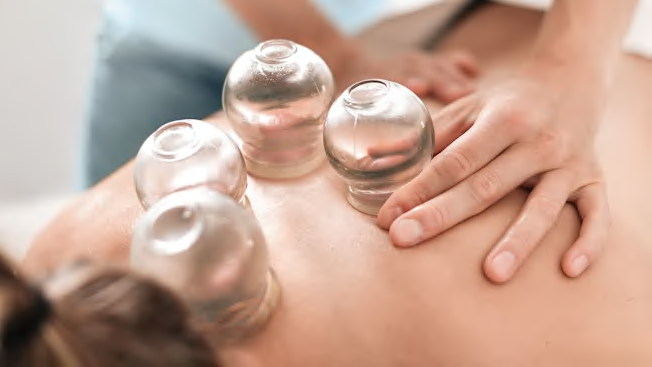
Photo: Getty Images Photo: Getty Images
Back Pain
What Works
Acupuncture: The American College of Physicians (ACP) recommends this therapy—where thin needles are inserted into specific spots on the body—for both acute and chronic lower back pain before trying medication. (Lower back pain is considered acute if it eases in less than six weeks and chronic if it lasts for more than three months.) "It may relax overactive muscles, and increase blood flow into the region," says Tyler Moldoff, DPT, a physical therapist at the Hospital for Special Surgery in New York City. Medicare covers it for diagnosed chronic lower back pain.
Spinal manipulation: The ACP suggests this therapy—where a chiropractor or physical therapist applies pressure to spinal joints or moves them past their normal range—for acute and chronic lower back discomfort before trying meds. "It releases gas and pressure in the joints, calming nearby muscles," says Moldoff. Medicare covers this for subluxation (slightly misaligned vertebrae). Check with your doctor first; in some cases, it could temporarily worsen discomfort.
Massage: The ACP advises this for acute—but not chronic—back pain. "If you’ve pulled your back muscles and are in a lot of pain, it makes sense," says Roger Chou, MD, director of the Pacific-Northwest Evidence-Based Practice Center at Oregon Health & Science University in Portland.
Mindfulness-based stress reduction: MBSR, where you learn to shift your focus away from your discomfort, significantly improved chronic lower back pain in a 2024 review of 18 studies. (Meditation and cognitive therapy helped, too.) Check local medical and back pain centers or search goodtherapy.org or psychologytoday.com for therapists.
Mind-body exercise: Yoga, tai chi, and Pilates were among the most effective physical activities for chronic back pain in a review of 118 studies. "All are supported by evidence, but the best research seems to be around yoga," says Chou. For optimal results, talk to your doctor; they may send you to physical therapy to learn the right moves.
The Jury Is Still Out
Cupping: This ancient Chinese practice involves applying suction cups to the skin, then pulling them quickly off to increase blood flow to the area and, thus, speed the healing process. The therapy may offer some short-term relief for chronic back pain, a 2024 review of studies suggests. But more studies and specific treatment protocols are needed, the researchers say.
Don’t Use
Kratom: Supplements have been linked to seizures and liver toxicity, according to the Food and Drug Administration. It’s illegal to market kratom in the U.S.
CBD: Cannabidiol, a substance in cannabis that doesn’t get users high, hasn’t been found effective for most back pain. And over-the-counter CBD isn’t FDA-regulated, so you don’t know what’s in it, says Chou. A 2024 review of studies found that some products contained ingredients that weren’t listed on labels—among them psychoactive substances.
Best Yoga Mats
Whether you want a super-cushy mat, a lightweight one that’s easy to tote around, or just a simple mat that won’t slide all over the floor, we have a pick for you.
Achy Joints
What Works
Tai chi: Have osteoarthritis in your knee or hip? The slow, gentle moves and deep breathing of this practice—which enhance strength and balance, among other benefits—are strongly recommended by the American College of Rheumatology. Look for nearby classes at community and senior centers, YMCAs, and YWCAs, or search the directory on the American Tai Chi & Qigong Association website.
Yoga: Various types of yoga reduced knee arthritis pain and stiffness in a 2024 review of eight studies. "Both yoga and tai chi build up isometric muscle strength," which helps release proteins that can reduce arthritis-related and systemic inflammation, says Moldoff. The researchers say that in-person supervised instruction is best (you can check community and senior centers, and Y’s for gentle yoga or "yoga for arthritis" classes).
The Jury Is Still Out
Glucosamine and chondroitin: Users of this supplement (which contains two substances that are naturally found in human cartilage) may feel some relief from joint pain. But this is known to have a strong placebo effect, so that may be at play in some instances. In addition, studies have had inconsistent results, according to Yale Fillingham, MD, an orthopedic surgeon and associate professor at Thomas Jefferson University Hospital in Philadelphia and co-author of the OA guidelines from the American Academy of Orthopaedic Surgeons (AAOS).
Turmeric: Supplements of this spice improved pain and function for people with OA—in some cases as much as over-the-counter pain relievers, in a review of 10 studies published in the British Medical Journal. The drawback: We don’t yet know the optimal dosage.
Acupuncture: Some people do find acupuncture helpful for arthritis-related discomfort, but the AAOS gives it a limited recommendation—meaning studies that show this therapy eased pain were of low quality or had mixed results.
Massage: The AAOS gives this a limited recommendation. "It appears to lead to very short-term improvements in pain and function, really only for days or a couple weeks," says Fillingham. The Arthritis Foundation advises talking with your doctor beforehand and notes that moderate pressure (not too light and not too hard) may be best. "You want to be very careful and even avoid deep pressure, because it could injure your bone, tendon, or joint," says Farah Hameed, MD, associate chair of the department of rehabilitation and regenerative medicine at Columbia University Medical Center in New York City.
Chiropractic: Some research, such as a 2022 Canadian study, suggests that this therapy can reduce OA pain. But it’s not appropriate for all kinds of arthritis, according to the Arthritis Foundation. And if you have any spinal degeneration, moving joints past their natural range of motion could worsen OA, Hameed says.
Best Massage Guns
CR evaluated percussive massagers based on handle ergonomics, ease of use, and the postural stress they put on the body.
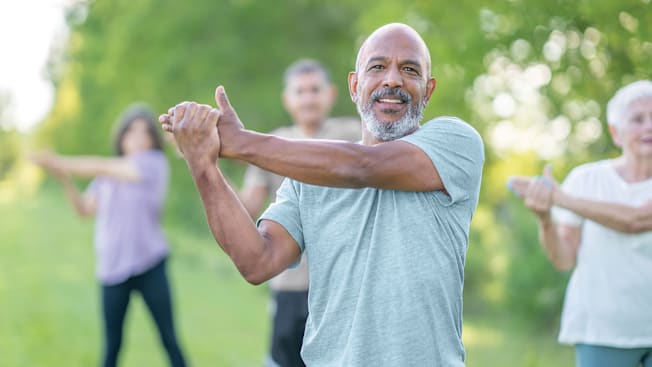
Photo: Getty Images Photo: Getty Images
Sleep Problems
What Works
Cognitive behavior therapy: This short-term therapy, aimed at changing thoughts and behaviors that may play a part in sleeplessness, is the gold standard for insomnia, says sleep medicine expert Eric Zhou, PhD, an assistant professor of psychiatry at Harvard Medical School in Boston. Plus, the relaxation techniques that are part of it—like slow, deep breathing—help further ease insomnia and improve sleep quality, so you feel more rested when you wake up, he says. CBT for insomnia may be covered by Medicare and other health insurers. Ask your doctor or a sleep specialist for a referral or check with the Society of Behavioral Sleep Medicine or the International Directory of CBT-I providers.
Hypnotherapy: Guided hypnosis, which puts you in a calm, focused state where you can access and use your inner resources, helps about half of those who try it sleep better. So says a 2023 review of more than 40 studies, published in the International Journal of Clinical and Experimental Hypnosis. (You’ll need to work with someone trained in hypnotherapy; see "How to Find a ‘Natural’ Healthcare Pro," below.)
Tai chi and yoga: Both can help you feel calmer and more relaxed, which can lead to fewer sleep disruptions, says Zhou. Tai chi and gentle yoga such as some forms of hatha are thought to increase levels of the brain chemical gamma-aminobutyric acid (GABA), which appears to play a role in mood and sleep. Studies such as a 2023 meta-analysis published in the International Journal of Environmental Research and Public Health suggest that tai chi helps with not only insomnia but also the depression and anxiety that can accompany it.
The Jury Is Still Out
Melatonin: There’s simply not enough proof that supplements of this sleep-regulating hormone work for chronic insomnia, says the American Academy of Sleep Medicine (AASM). But it may have benefits for certain other issues. "It’s recommended short-term to treat jet lag" and some uncommon sleep disorders, says Zhou. Otherwise, "it hasn’t been shown to help you get a better night’s sleep."
Vitamin D: A 2022 review of 19 studies published in the journal Nutrients suggested that this supplement may improve sleep quality—if you’re D-deficient. (Up to 35 percent of adults are thought to be low in this vitamin.) But the researchers say more information on its effects on sleep quantity and on sleep disorders is needed.
Magnesium: If you’re deficient in this mineral, as many people with insomnia—and a lot of the rest of us—are, you might consider a supplement, says sleep specialist Michael Breus, PhD, author of "Energize!" (Little, Brown Spark, 2021). A 2021 review of studies, published in BMC Complementary Medicine and Therapies, suggested that these supplements helped older adults with insomnia doze off about 17 minutes faster, on average, and added about 16 minutes to their total snooze time—but the authors say more rigorous research is needed. Note that magnesium supplements may cause diarrhea.
Ashwagandha: Supplements and extracts from this evergreen shrub may hold some promise. But so far, the evidence has been mixed, says Breus, and ashwagandha can carry side effects such as diarrhea and headache and may increase testosterone and thyroid hormone levels. If you take medications to manage blood pressure or blood sugar, talk with your doctor before trying ashwagandha. It can affect both.
Acupuncture: There’s been little evidence so far on traditional acupuncture for insomnia. But electroacupuncture—which passes low-frequency electric current through the needles that are used—helped with sleeplessness and depression, in a study published in 2022 in JAMA Network Open.
Don’t Use
Valerian: Supplements of this flowering plant have worked no better than a placebo in most research studies, so the AASM advises against using it as a sleep aid. "Valerian does contain GABA [a brain chemical], which helps promote sleep," says Zhou. "But we’re not sure the GABA even enters your brain, which is where it needs to go if it’s going to work."
Guide to Better Sleep
Everything you need for a great night’s rest, every night.
Mental Health
What Works
Acupuncture: Four weeks of acupuncture can make a big difference in the moods of those who are dealing with depression, according to a 2024 meta-analysis of 20 studies published in the journal Frontiers in Neuroscience.
Music therapy: This technique, where a therapist uses music to help you process your feelings, along with treatments like antidepressants and talk therapy, eased depression short-term more than meds and therapy alone, in a 2017 Cochrane review. "Music reaches the parts of your brain that aren’t necessarily cognitive, but impact emotions and emotional regulation," says Philip R. Muskin, MD, a psychiatrist at Columbia University Irving Medical Center in New York City. You can look for therapists at musictherapy.org, but you don’t need formal therapy to benefit, he says. Regularly listening to relaxing music may help, too.
Yoga: All kinds of exercise can boost mood, but yoga may be better than most. Here’s why: "It’s mindfulness combined with movement," says Ramaswamy Viswanathan, MD, president of the American Psychiatric Association. Hence the findings of a meta-analysis published in 2023 in the journal Frontiers in Psychiatry, which concluded that yoga can help with the symptoms of both depression and anxiety. For maximum mood benefits, do it consistently—say, three or four days a week, says Muskin. And note that it doesn’t matter which type of yoga you choose, or whether you take a formal class or just do poses at home.
The Jury Is Still Out
SAM-e: This supplement, a synthetic form of a compound found naturally in the body, has been shown to be helpful for depression—and appears to be very safe, Muskin says. For instance, a review of studies published in 2020 in the Annals of General Psychiatry found that taking SAM-e daily eased major depression. But the authors say more large studies are needed. Still, if you’re considering trying it, Muskin advises starting with a supplement of about 200 to 400 mg a day; some people may need up to 2,400 mg taken in several smaller doses.
Bright light therapy: While this treatment—where you sit in front of a special light-emitting box for a period of time each morning—has long been the standard for seasonal affective disorder, it may offer help for garden variety depression, too. Because studies done on it so far for typical depression aren’t high-quality, "it’s fine to try it as an adjunct to other treatments, but do it under your doctor’s guidance," says Viswanathan. You’ll need a device that’s designed specifically for this purpose. Get tips on how to choose a light box at cet.org/how-to-select-a-light-box. (And see our review of the best sunrise alarm clocks.)
Don’t Use
St. John’s wort: While this supplement may ease depression, it can interact with many drugs. For instance, St. John’s wort can affect serotonin levels, so taking both the supplement and an antidepressant that has the same action may lead to potentially serious side effects. It can also interact with some migraine drugs and blood thinners, making them less effective.
CBD: Both CBD and various forms of cannabis were found to be ineffective for depression, in a 2019 meta-analysis published in the journal Lancet Psychiatry. According to the researchers, "the use of cannabinoids as treatments for mental health disorders cannot be justified at this time." Also, you can’t rely on CBD product labels to be correct.
Heart Issues
What Works
Omega-3 fatty acids: Taking about 3 daily grams of these supplements reduced high blood pressure modestly, according to a 2022 American Heart Association review. But dining on fatty fish like salmon, herring, mackerel, or sardines two to three times a week may give you similar benefits, says Nieca Goldberg, MD, a clinical associate professor at the New York University Grossman School of Medicine in New York City. Omega-3 supplements also appear to reduce triglycerides (fats that circulate in the blood along with cholesterol). But if yours are high, a prescription-level omega-3 may be best, Goldberg says.
Berberine: This supplement helps reduce cholesterol absorption, and one meta-analysis found that 900 to 1,500 mg daily significantly improved total cholesterol, LDL ("bad") cholesterol, and triglycerides. "We sometimes use it in people who can’t reach their cholesterol target even on statins," says Robert S. Rosenson, MD, director of the Metabolism and Lipids Program for the Mount Sinai Health System in New York City.
Meditation: Both meditation and mindfulness-based stress-reducing techniques—like focusing on your breathing—can help you better manage high blood pressure and the stress that can raise it, according to the AHA. "For people with mildly elevated blood pressure, this may be enough to keep them off of medications," says Goldberg. Even using an app like Calm or Smiling Mind for a few minutes a couple of times a day may help, she says.
Yoga: People who regularly do yoga are 85 percent more likely to have normal blood pressure than others, says a 2022 study in BMC Public Health. The practice "induces a relaxation response in your body that lowers your blood pressure," says Goldberg. She advises avoiding hot yoga, which can lead to dehydration.
The Jury Is Still Out
Plant sterols and stanols: These substances, found in many whole grains, fruits and vegetables, nuts, seeds, and legumes, block LDL cholesterol absorption, says Rosenson. They’re also added to certain margarines (Benecol) and to supplements such as Benecol Soft Chews and CholestOff. But you should get enough from a heart-healthy diet, and there’s no proof yet that adding them to foods or taking them as supplements cuts heart disease risks, he says.
Coenzyme Q10: If you have heart failure, some studies suggest that supplements of this antioxidant—which the body naturally produces—are helpful: They may lower the likelihood of hospitalization and death from heart failure. But whether they help lower high blood pressure or cholesterol or ease the side effects of cholesterol drugs like statins is a question mark. "It falls into the category of it won’t harm you, but we don’t know that it will help you," says Rosenson.
Probiotics: There’s some evidence that probiotic supplements ("good" bacteria and yeasts) may reduce cholesterol. But we haven’t yet determined which strains are effective, says Goldberg. For now, you may want to put probiotic-rich foods, like Greek yogurt and fermented foods like kimchi, in regular rotation in your diet.
Don’t Use
Red yeast rice: These supplements are basically unregulated statins, says Rosenson, referring to prescription cholesterol drugs. They contain monacolin k, which is identical to the active ingredient in some statins. "If you’re already taking a statin, you could get too much," he says. In addition, a 2021 analysis of red yeast rice supplements from 37 brands found that 36 had high levels of a substance called citrinin, which can cause kidney damage.
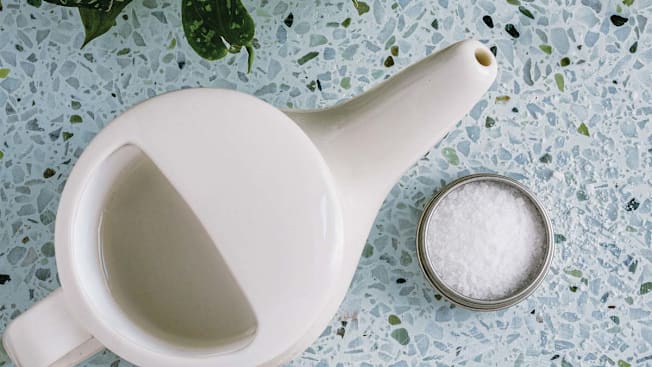
Illustration: Federico Gastaldi Illustration: Federico Gastaldi
Cold and Flu
What Works
Honey: A tablespoon of this sweetener may help quell a cough, by soothing a sore throat and helping to moisten the mucous membranes in your mouth, says William Schaffner, MD, a professor of preventive medicine at the Vanderbilt University Medical Center in Nashville. For instance, a 2021 meta-analysis published in BMJ Evidence-Based Medicine found that honey reduced both the frequency and severity of a cough.
Saline nasal irrigation: Flushing your nose with mildly salty water temporarily relieves cold symptoms because it moistens your mucous membranes and helps flush out mucus, says Schaffner. You can use a saline spray or a neti pot, a small "vessel" with a long snout that you fill with distilled, sterile, or previously boiled salt water; saline sprays and neti pots are widely available at drugstores and online. For a neti pot, clean it well before its next use: "Otherwise you’ll end up rinsing your nose next time with a whole lot of bacteria," Schaffner says. This strategy works well for more serious respiratory infections, too: A 2022 study published in the Ear, Nose & Throat Journal found that people at high risk for COVID-19 complications who used a saline nasal spray twice a day soon after testing positive were much less likely to need to be hospitalized. If you have a sore throat as well as a stuffy nose, gargling with salt water several times a day may soothe it.
The Jury Is Still Out
Vitamin C: Supplements of C may ease cold symptoms, but not by a whole lot: A 2023 meta-analysis of 10 studies published in BMC Public Health found that at least 1 daily gram of vitamin C taken regularly seemed to decrease the severity of a cold by about 15 percent.
Vitamin D: Some, but not all, studies suggest that daily supplements of the so-called sunshine vitamin may be protective against upper respiratory infections, if you’re one of the many people who are deficient in it, Schaffner says. The likely reason the supplement may help: Low levels of D are linked to decreased immune system function.
Zinc: Sucking on zinc lozenges when cold symptoms first hit may help cut their duration, according to a 2024 Cochrane review of studies. But the authors say the research behind that finding is low-quality. So we may have to wait for additional research to get more clarity on zinc for cold relief. If you try these over-the-counter products, be aware that they can leave an unpleasant metallic taste in your mouth. Brushing your teeth or using mouthwash may help.
Probiotics: These supplements may offer some protection, reducing the likelihood of an upper respiratory infection by about 24 percent, according to a 2022 Cochrane review. But there’s not enough research yet to know for sure which strains are actually effective, says Schaffner. So you may want to stick with foods that naturally contain probiotics, like yogurt, kefir, and sauerkraut, for the time being.
Don’t Use
Elderberry: This supplement is reputed to be a flu (and cold) fighter, but a 2020 study published in the Journal of General Internal Medicine found no such benefits. In it, people who took elderberry extract four times daily for five days saw no difference in how long their flu lasted and how lousy they felt compared with those who got a placebo. Elderberry has also been promoted as a way to treat COVID-19, but there’s no evidence for that, says the National Center for Complementary and Integrative Health.
Echinacea: While supplements of this plant (aka coneflower) have long been touted to both prevent and treat respiratory infections such as colds, studies don’t bear that out, according to Schaffner. The last good research on it—a 2014 Cochrane review that looked at 24 randomized controlled trials—agrees: It concluded that echinacea didn’t appear to have any cold-busting qualities.
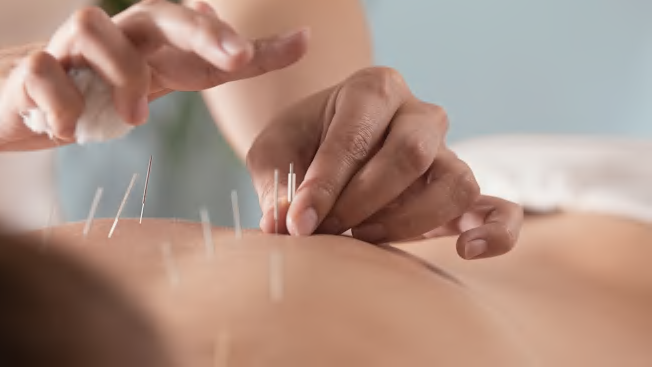
Photo: Getty Images Photo: Getty Images
Digestive Trouble
What Works
Acupuncture: Having this treatment for anywhere from two to eight weeks helped constipated folks get more regular in a 2020 meta-analysis. "It seems best to treat constipation, but some people find it beneficial for any sort of abdominal symptom," says William Chey, MD, chief of the division of gastroenterology at the University of Michigan Medical Center in Ann Arbor. "We’ve even added a GI acupuncturist to our practice." Check with your health insurer to see whether it covers acupuncture for such issues.
Yoga: Doing yoga regularly appears to keep your digestive system running more smoothly. For instance, a 2021 study published in the Journal of Bodywork and Movement Therapies found that people between 60 and 75 who did yoga—no particular type was specified—three times a week for three months reported significant improvement in constipation (as a bonus, they also slept better). And adults with irritable bowel syndrome who did weekly online sessions of gentle hatha yoga for eight weeks said they had less abdominal pain, in a 2023 study in the American Journal of Gastroenterology.
Gut-directed hypnotherapy: This therapy teaches you how to divert your brain’s attention from discomfort and relaxes the muscles and nerve endings in the gastrointestinal tract, says Chey. A 2020 review of 41 randomized controlled trials found that it helped relieve abdominal pain in people with IBS. "It seems to be about as effective as cognitive behavior therapy, which is really the gold standard when it comes to IBS therapies," Chey says. It’s often covered by insurance for IBS.
The Jury Is Still Out
Turmeric: Curcumin, a compound in this spice, may be as effective as a commonly used medication for curbing heartburn, according to a 2024 study in BMJ Evidence-Based Medicine. In the study, people who took turmeric supplements reported as much relief as those who took a standard dose of the drug omeprazole. But some other studies have found that turmeric increases GI upset, says Chey, so more research is needed. Read more about turmeric.
Peppermint oil: The American College of Gastroenterology’s 2021 guidelines conditionally recommend this oil for the abdominal pain of irritable bowel syndrome, noting that it appears helpful but that more research is needed. If you’re going to try it, take it in enteric coated capsules, says Chey. Uncoated ones can cause heartburn.
Probiotics: While your digestive system needs these microbes, supplements aren’t generally advised for GI trouble, says Chey: "We know gut bacteria plays a role in chronic constipation and diarrhea, and even conditions such as irritable bowel syndrome, but we don’t have a good sense of the best probiotic strains." For now, it’s best to focus on probiotics from foods like yogurt and sauerkraut.
Don’t Use
Chamomile: Though tea and supplements are said to soothe an upset stomach, there’s no good evidence they do. And chamomile may trigger allergy symptoms if you’re allergic to daisies, marigolds, mums, or ragweed.
Wormwood: It may be dicey to use supplements and extracts of this herb—which are purported to relieve stomach pain: Some research suggests it may damage the nervous system (the brain, spinal cord, and nerves).
Risky Remedies to Avoid
In addition to several treatments mentioned earlier in this article—such as kratom, red yeast rice, St. John’s wort, and wormwood—the following may harm your health. Our experts advise that you steer clear.
Weight loss supplements: You may see various over-the-counter products marketed as weight loss aids, such as Hydroxycut and Jacked Factory Burn XT. According to the National Institutes of Health’s Office of Dietary Supplements, there’s little evidence that weight loss supplements are effective. Plus, some may interact with medications, and a few may even cause harm. Last October, for instance, the Food and Drug Administration cautioned that the weight loss supplement Itcha XS contained unlisted antidepressants that should be only in prescription medications. Also in October, the FDA noted that the Body Shape Weight Loss System was found to contain sibutramine. This controlled substance was taken off the market in 2010 because it can substantially increase both blood pressure and heart rate.
Yohimbe: Avoid any supplements that contain this herb. While yohimbe is said by some to treat libido and erectile dysfunction problems, it can hike blood pressure and cause a rapid heart rate, along with panic attacks and liver and kidney issues. Also, be aware: Earlier this year, the FDA cautioned consumers not to use several sexual enhancement supplements on the market, after they were found to contain sildenafil (the active ingredient in the prescription drug Viagra).
Comfrey: Some say that this herb works to relieve cough, stomach problems, and chest pain, and it’s even alleged to treat cancer. But comfrey has actually been linked to cancer as well as to liver damage. It’s banned in oral form in the U.S. for those reasons, but it’s still available online.
Kava: A plant that may come in supplement form (typically as a tablet or extract), kava is reputed to ease anxiety and insomnia. But it can cause liver damage and may reduce the effectiveness of prescription medications for conditions such as Parkinson’s disease.
Detox and cleanses: These products may come in forms like capsules or liquids, or be marketed as programs where you take certain actions (such as fasting or eating or drinking specific foods or beverages, like juices). Typically, they’re purported to help people rid themselves of unspecified "toxins," and often, to lose weight, too. But using these is rarely necessary, because your body naturally gets rid of toxins, says Amy Locke, MD, chief wellness officer and professor of family and preventive medicine at the University of Utah in Salt Lake City. The FDA has also gone after some manufacturers for selling products that have harmful ingredients. For example, in 2019, the agency advised consumers not to use a product called Detox Plus after it was found to contain tadalafil, the active ingredient in the prescription erectile dysfunction drug Cialis. It could "lower blood pressure to dangerous levels," the agency said. Get more information on risky supplements.
Chelation: This prescription therapy, where a drug called EDTA is delivered into the bloodstream via IV, is FDA-approved for a few specific medical issues, like lead poisoning. But it’s also offered by some medical practitioners for other conditions, such as Alzheimer’s disease, autism, cancer, and heart disease. You may see OTC chelation supplements for sale as well. Unapproved uses come with risks such as kidney damage, calcium deficiency, and low blood pressure, and the FDA cautions against it.
Ear candling: Promoted as a way to remove excess earwax and treat sinus infections, sore throats, colds, and the flu, this involves placing a hollow candle into your ear canal and then lighting it. But the American Academy of Otolaryngology warns against ear candling, noting that the practice can severely damage your ear drum and ear canal—by causing issues like burns and infections.
How to Find a 'Natural' Healthcare Pro
The mini-guide below can help you locate practitioners with the right credentials—and avoid potential pitfalls. As you’re deciding whom to see, ask providers about their training and education, and whether they’re licensed or certified in the treatment you’re interested in, says Jeremy Ng, PhD. Also, find out whether they’ll communicate with your primary care doctor or specialist, and get specifics about any therapy you’re considering: risks, costs, insurance coverage, and how it will work with your current care.
Acupuncturist (LAC): In most states, acupuncturists must graduate from an accredited master’s or doctorate program in the practice and be both state-licensed and certified by the National Certification Commission for Acupuncture and Oriental Medicine. You can search for practitioners at asacu.org/find-a-practitioner or directory.nccaom.org.
Chiropractor: In the U.S., chiropractors must earn a Doctor of Chiropractic (DC) degree, pass the National Board of Chiropractic Examiners exam, and have a state license (search for local providers at handsdownbetter.org/find-a-doctor).
Homeopathic practitioner: These are often MDs or DOs or naturopathic doctors. Homeopathy is based on the idea that "like cures like." So a practitioner might treat a cold with diluted red onion extract—because both a cold and exposure to onion can cause a runny nose and watery eyes. The National Center for Complementary and Integrative Health says there’s little evidence this approach has any effect.
Hypnotherapist: Anyone from an MD or RN to a psychologist or social worker may do hypnotherapy. Practitioners should also be certified by a professional organization like the American Society of Clinical Hypnosis or the Society for Clinical and Experimental Hypnosis.
Integrative medicine doctor: These are often licensed physicians who combine conventional and complementary therapies. Look for one who is board-certified in this combination, which is called integrative medicine. Search for a provider near you.
Massage therapist: Education and licensing requirements differ from state to state but usually call for several hundred hours of training and regular continuing education. See your state’s requirements and look for local practitioners.
Naturopath (ND or NMD): In about half of the states (check yours at aanmc.org/licensure), practitioners—who use approaches like herbs, supplements, homeopathy, and "detoxification"—must graduate from a four-year naturopathic school and pass a licensing exam. In states without these regulations, you can’t be sure how a naturopath has been trained.
How to Pick a High-Quality Supplement
When you’re shopping for dietary supplements, it’s important to choose carefully—because the Food and Drug Administration generally doesn’t regulate supplements the way it does drugs. So you can’t always be sure that what’s on the label is what’s in the bottle. For instance, in a 2023 study published in JAMA, 22 of 25 brands of melatonin gummies evaluated contained different amounts of the hormone from what was listed on their labels. One product had 347 percent of the labeled amount.
What Should You Do?
Check supplement packaging for a seal from an independent testing group like the nonprofit US Pharmacopeia, which sets the most widely accepted standards for dietary supplements, according to CR’s experts. (Find a list of USP-verified products at quality-supplements.org.) Another reputable testing organization is the not-for-profit NSF International; search info.nsf.org/certified/dietary for NSF-certified supplements).
UL Solutions and ConsumerLab, two for-profit companies, also test supplements.
Editor’s Note: This article also appeared in the January/February 2025 issue of Consumer Reports magazine.
















